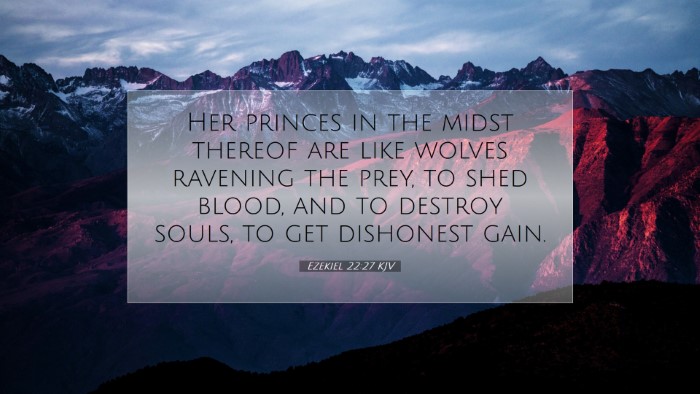Bible Commentary on Ezekiel 22:27
Ezekiel 22:27: “Her princes in the midst thereof are like wolves ravening the prey, to shed blood, and to destroy souls, to get dishonest gain.”
Introduction
This verse from the book of Ezekiel serves as a poignant indictment of the corrupt leadership within Jerusalem. The metaphorical use of “wolves” to describe the princes illustrates the predatory nature of their governance, reflecting both moral and ethical decay. The insights drawn from various public domain commentaries provide a richer understanding of the text’s implications for ancient Israel and its relevance today.
Analysis of the Verse
The imagery of wolves is particularly striking, symbolizing brutality and selfishness. As Adam Clarke notes, “the princes are portrayed as ravenous wolves, not caring for the flock, but seeking only their own gain.” This harsh imagery calls attention to the destructive impact of corrupt leadership on the vulnerable populace.
Matthew Henry elaborates further, emphasizing how such leaders “shed blood and destroy souls,” indicating not only physical violence but also moral and spiritual destruction. The phrase highlights a complete disregard for human life and dignity, underscoring the severity of Judah’s sin against God.
Albert Barnes provides clarity on the phrase “to get dishonest gain,” linking it to socioeconomic injustice. He articulates that the leaders’ primary concern is personal enrichment, often at the expense of justice, furthering their treacherous behavior rooted in greed.
Context of the Passage
This passage is situated within a broader context of judgment against Jerusalem for its various transgressions. Ezekiel is tasked with delivering God’s message to the people who have strayed from righteousness. As a prophet during the Babylonian exile, Ezekiel’s messages were meant to call the people back to their covenantal responsibilities.
The verses preceding Ezekiel 22:27 highlight various social injustices and idolatries that plague society. This corruption reaches its zenith with the leaders, as indicated in 22:26, where the priests are criticized for profaning the holy and the people for following misleading practices. The cumulative effect of these actions illustrates a society in moral disarray.
The Role of the Princes
The depiction of the princes as “wolves” serves as a stark reminder of the responsibility leaders hold in guiding their constituents towards justice and righteousness. Matthew Henry remarks on the “moral accountability of those in power,” emphasizing that leaders must embody integrity and protect the marginalized.
Clarke’s commentary challenges contemporary leaders to reflect on their leadership style: “Are we guiding our communities with care and justice, or are we contributing to their destruction?” This rhetorical question prompts a self-examination of today’s leaders, urging them to pursue the well-being of those they serve rather than selfish agendas.
Theological Implications
Theological interpretations of Ezekiel 22:27 transcend the immediate historical context. It serves as a reminder of God’s overarching justice and moral order. In this regard, the verse reflects God's disdain for corrupt governance and the consequences that arise from it. Barnes rightly notes that “where there is no justice, there can be no peace,” emphasizing that the absence of righteousness in leadership leads to societal chaos.
This passage also serves as a convicting call for repentance and reform. As Henry remarks, “God's judgments upon the wicked are designed to awaken the righteous to seek justice.” The hope within this distressing indictment is that recognition of such corruption can lead to collective transformation and renewal.
Applications for Today
The lessons distilled from Ezekiel 22:27 are profoundly applicable for modern pastors, students, and theologians. The text compels readers to confront the realities of leadership within their own communities. In a time where moral integrity is frequently compromised in leadership, the metaphor of wolves serves as a cautionary tale against self-serving actions.
-
Corporate Responsibility:
The church has a responsibility to advocate for justice and to confront corruption within its ranks and in society. The failures of leadership—be they political, spiritual, or social—demand accountability and an unwavering commitment to the truth.
-
Personal Integrity:
As individuals, believers are called to embody the principles of righteousness and justice in their personal and professional lives. The lives of the faithful should contrast the predatory behaviors characterized by greed and selfish gain.
-
Community Engagement:
Lastly, there is an imperative for engagement with the broader community, which includes advocating for the voiceless and challenging injustices. The prophetic call is not merely to condemn but to actively work towards a society that reflects God's justice and peace.
Conclusion
Ezekiel 22:27 provides a sobering reminder of the effects of corrupt leadership on the body politic and spiritual life of a community. Drawing from the insights of Matthew Henry, Albert Barnes, and Adam Clarke, the themes of accountability, the sacred duty of leadership, and the necessity for righteousness are driven home. As students of Scripture, believers are called to not only reflect on these truths but to live them out in a world that desperately seeks truth, justice, and hope.


